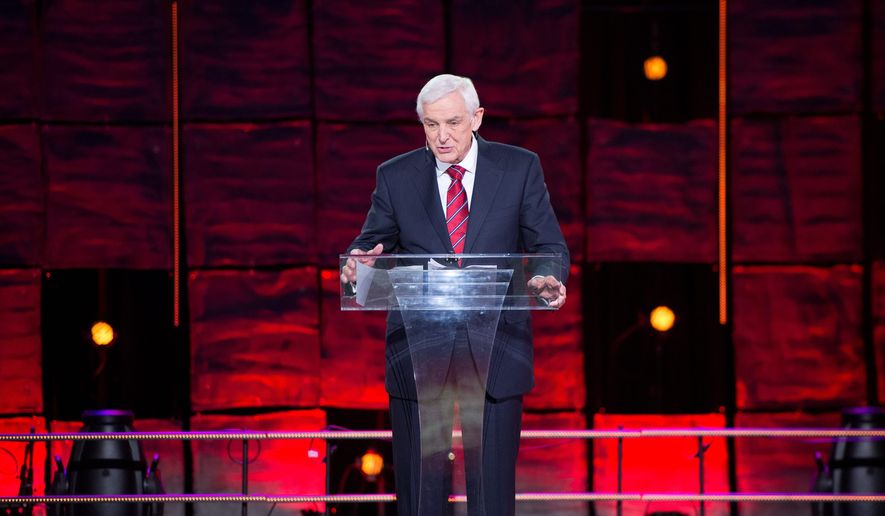Evangelical Christians risk letting societal divisions divert their focus from biblical prophecy, a popular evangelical pastor and broadcaster says.
The Rev. David Jeremiah, whose “Turning Point” television and radio broadcasts have an estimated 400 million listeners worldwide, said events of the past 18 months inspired his new book, “Where Do We Go From Here?” released this week by Thomas Nelson Publishers. The book’s subtitle promises to explain “How tomorrow’s prophecies foreshadow today’s problems.”
Speaking to The Washington Times, Mr. Jeremiah admitted concern over societal arguments that deflect attention from matters of faith. He said an overemphasis on racism to the exclusion of spiritual matters could increase division in the Christian world.
“One of the great principles of socialism is division,” he said, adding that accusations of racism is a means of dividing people in evangelical circles now.
“If everything is racist, then nothing is racist,” Mr. Jeremiah said. “In our culture today, we have many racial issues that need to be dealt with. And in my estimation, we were making some progress, and growing and dealing with those things. But when all of the discussion now is, ‘Everything is racist,’ the real issues never get touched.”
Beginning with the 1970 publication of “The Late, Great Planet Earth” by Hal Lindsey, interest in apocalyptic themes has been strong among the nation’s evangelical Christians, who account for 14% to 35% of the U.S. population, according to estimates.
Mr. Jeremiah said his new volume is a guide for those perplexed by today’s tumultuous circumstances.
“The Bible teaches us that we can have patience, and endurance, and longsuffering with joy,” he said. “I think that we can be happy people in the midst of all of this and help other people find joy as well.”
Mr. Jeremiah, 80, has pastored Shadow Mountain Community Church in El Cajon, California, since 1981, and started his media outreach the following year. He said this latest book was partly inspired by a television news program.
“I remember sitting at breakfast one time with my wife, and we had watched the morning news, which is a big mistake,” he said. “And I just said to her, ‘You know, it sometimes feels like we’re watching them dismantle our country, piece by piece.’”
He began preaching about the societal changes caused by the COVID-19 pandemic, social unrest and concerns about “cancel culture,” among other topics, and congregants responded. The church has seven locations in the San Diego area, including Arabic and Hispanic congregations.
“People said, ‘You know what? You’re trying to answer the questions. I’ve always wanted to ask somebody, but I don’t know who to ask,’” Mr. Jeremiah said.
The book covers current events topics such as socialism, globalism, economic chaos, and a “falling away” from the Christian faith. Pandemics are discussed in one chapter, although Mr. Jeremiah — who said he’s been vaccinated against the coronavirus — said COVID-19 isn’t necessarily a sign of a pending apocalypse.
On the other hand, Mr. Jeremiah said, the pandemic has focused attention on spiritual matters, much the way the 9/11 terrorist attacks temporarily drove people to churches.
Attendance at his church approximates pre-pandemic levels, and interest in “small group” Bible studies where members gather in each other’s homes has increased, he noted.
“I think COVID-19 has created a sense of seriousness about where we are in life that many people had lost,” he said. “COVID-19 is still with us. It’s still an everyday reality. We’re back in church, and we’re at about 90% of our congregation [attendance] before COVID. But there is a real earnestness about our people, a desire to really grab hold of truth, lock into small groups, to find out ways to serve, and realize that whatever the scripture say about the future, the time to make a difference is today.”
One student of apocalyptic literature, Alec Ryrie, professor of divinity at London’s Gresham College, said interest in puzzling out the future has a long history in Christian circles.
“It’s such a recurrent theme, not just in, in Protestant history, but in Christian history and beyond,” Mr. Ryrie said in a telephone interview. “People really want to know what’s going to happen, right at the most basic level.”
Noting that several of the more than 50 books written by Mr. Jeremiah concern prophetic themes, Mr. Ryrie said: “The fundamental message behind all this is the world may look chaotic and dangerous, scary, unpredictable stuff that you don’t expect to be happening is happening. But there is a deeper plan. God is in charge. And if we can only understand that plan, then things are going to work out OK.”
• Mark A. Kellner can be reached at mkellner@washingtontimes.com.




Please read our comment policy before commenting.